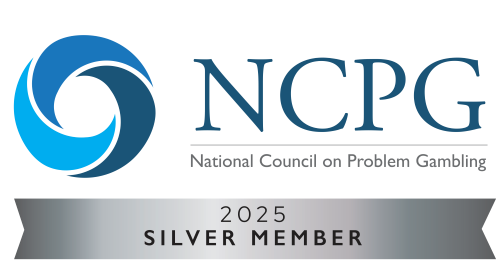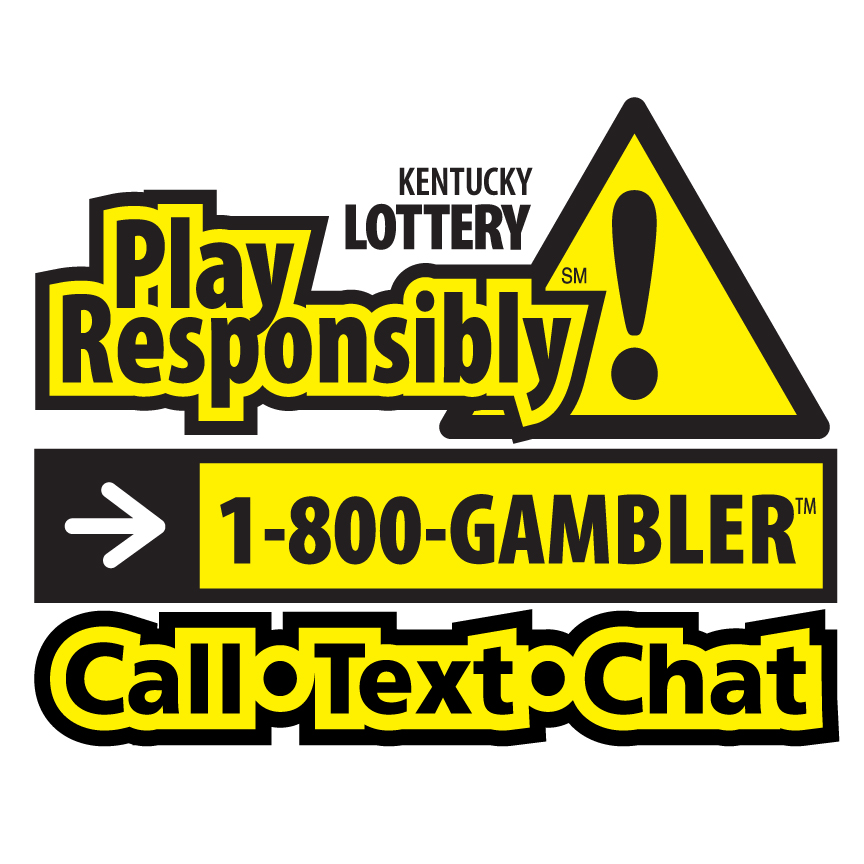Responsible Gambling
This is a real money gambling website, and the Kentucky Lottery wants our games to be fun and entertaining. Please gamble responsibly and only bet what you can afford. If the fun stops, there is help and information concerning problem gambling issues. For gambling addiction help and support, you can always call or text 1-800-GAMBLER. You can also visit https://www.kygamblinghelp.org to chat with a gambling counselor or for additional information.
Keep reading for more information about our program, warning signs, how you can self-exclude from playing our games online, and how to keep gambling safe.
Please, Play Responsibly. It truly is just a game.
Responsible Gambling: Call, text or chat for help
Anyone seeking help or information is encouraged to call 1-800-GAMBLER. Hotline staff will send you more information about problem or compulsive gambling, or make a referral to the closest certified problem gambling counselor or Gamblers Anonymous meeting.
If you don’t want to actually speak to someone, you can:
- Text 1-800-GAMBLER and connect with someone
- Chat with staff online
- Find more information about Gamblers Anonymous at http://www.gamblersanonymous.org.
Unfortunately, Kentucky provides no publically-funded direct counseling services for problem or compulsive gamblers. The Kentucky Council on Problem Gambling, along with the Kentucky Lottery, has advocated for more than a decade for these services to be put in place.
Our Commitment
The Kentucky Lottery was one of the first in the United States to establish a “Play Responsibly” program back in 1996, and has served as a model for many other state lotteries. We were the first lottery in the U.S. to hold all three national and international responsible gambling certifications, showing again our commitment to establishing and maintaining best practices.
Warning Signs of a Problem
One of the most standard diagnostic tools used by counselors to diagnose gambling problems is a simple two question exercise known as the Lie/Bet Questionnaire:
- Have you ever had to lie to people important to you about how much you gambled?
- Have you ever felt the need to bet more and more money?
If you answered yes to one or more of these questions, further assessment is recommended.
Other questions to ask include:
- Have you often gambled longer than you planned?
- Have you ever been untruthful to yourself or anyone else about your gambling habit?
- Have your thoughts of gambling caused you to lose sleep?
- Have you used your income or savings to gamble while letting bills go unpaid?
- Have you made repeated, unsuccessful attempts to stop gambling?
- Have you ever broken the law or considered breaking the law to finance your gambling?
- Have you borrowed money to finance your gambling?
- Have you ever felt depressed or suicidal because of your gambling losses?
- Have you been remorseful after gambling?
- Have you gambled to get money to meet your financial obligations?
Again, a yes to any of these questions indicates further assessment is recommended.
Self-Exclude
If you want to take yourself out of the games on the Internet and stop entering tickets for second chance promotions, you can self-exclude (deactivate your account). Log in to your Fun Club profile page and click Deactivate My Account.
During your self-excluding period, you will no longer:
- be able to access your Fun Club account
- play online
- enter our second chance promotions
- receive any marketing communication from us
When you self-exclude, you will also forfeit any existing entries you have for second chance promotions.
BEFORE you self-exclude, be sure to cash out any winnings you may have in your online account. You will not be able to access your winnings once you self-exclude. Also, deposited funds cannot be returned.
You’ll set the time for how long you want to be prohibited from accessing your Fun Club account. You can also permanently self-exclude. Once you self-exclude, it cannot be reversed. At the end of your selected time period, you may call Customer Service to reactivate your account. You cannot create another account.
If you follow us on social media, you’ll need to unfollow the Kentucky Lottery in order to stop receiving updates. We are unable to do this for you.
Using tools like limit setting and timeouts
When playing our games online, keep an eye on the upper right corner of the screen. The time clock lets you know how long you’ve been on the site. Set an amount of time you want to spend on the site – and then stick to it.
We also have deposit limits in place for any account. The maximum amount of money that can be deposited in an account weekly is $850. The monthly deposit limit is $4,250. If you wish to make your limits even lower, you can do so by going to your “My Account” page and clicking on the “My Limits” option. If you ever change your deposit limits, there is a cooling off period imposed by which the change will not occur for 24 hours after the change is made. You will not be able to ever raise limits past what has been set by the Kentucky Lottery.
Tips on how to keep gambling safe
Understand the odds of any game you’ll be playing. A complete list of odds for every game we offer is available on our website.
Remember there is no special way to play that will help you beat the odds – it’s truly the luck of the draw!
Set a reasonable limit on how much money you’re prepared to spend – and then stick to it. You can set limits for your iLottery account on your “My Account” page by clicking the “My Limits” option.
Understand and recognize the signs of problem gambling (listed above).
Never spend more than you can afford. Call 1-800-GAMBLER for help if you find yourself losing more than you can afford or that you intended to spend.
Myths associated with games
Personal strategies or lucky rituals may be a fun pastime, but they have no impact on the final outcome of a game. Be especially wary of someone trying to sell you “lucky” numbers or a play strategy – they don’t work. That’s because the games are random in nature – you can’t predict what combination of numbers will be drawn or which scratch-off ticket will be a winner.
You will not improve your odds of winning by:
- Playing the same numbers every week
- Picking certain numbers more or less often than others in the past
- Buying draw tickets from a store where a large winning ticket was previously sold
Underage gambling
Kentucky law (KRS 154A.110) clearly states, “No ticket shall knowingly be sold to any person under the age of eighteen”. This applies to the iLottery site as well. A component of the verification process during account set up is confirming the person’s age.
State law also states, “Any person who knowingly sells a lottery ticket to a person under eighteen (18) years of age shall be guilty of a violation for the first offense and for each subsequent offense shall be guilty of a Class B misdemeanor”.
If you believe a retailer is selling tickets to minors, please notify our security department at (502) 560-1804.
Kentucky Council on Problem Gambling
The Kentucky Council on Problem Gambling (KYCPG) is a non-profit corporation funded by memberships and donations. It is governed by a board of directors that volunteers its services to fulfill the vision, mission and goals of the organization. Prime among these missions is serving as the focal point for problem gambling issues in the Commonwealth of Kentucky, increasing awareness and prevention of problem gambling, advocating for widespread availability of treatment for problem gamblers, and promoting research and education on problem gambling.
For more information on the KYCPG and the resources it makes available, please visit www.kygamblinghelp.org.
National Council on Problem Gambling
The Kentucky Lottery is a member of the National Council on Problem Gambling (NCPG). The Council serves as the national advocate for programs and services to assist problem gamblers and their families. NCPG works to improve health and wellness by reducing the personal, social and economic costs of problem gambling by leading state and national stakeholders in the development of comprehensive policy and programs for all those affected by problem gambling.
For more information on the NCPG and the resources it makes available, please visit http://www.ncpgambling.org. For Problem Gambling help in Kentucky, visit https://www.ncpgambling.org/help-treatment/help-by-state/kentucky.


